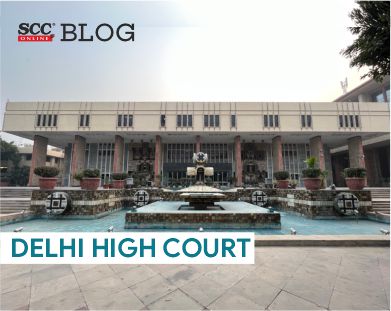Delhi High Court: In a case, wherein Dabur had sought an interim direction to restrain the Advertising Standards Council of India (ASCI) from creating impediments in the broadcast of an advertisement for its health drink ‘Vita', a Single Judge Bench of Manoj Kumar Ohri, J. dismissed Dabur's plea and held that it would be unfair on Dabur's part, which was a member of the ASCI, a self-regulatory body, “to enjoy the privileges of self-regulation and in the same breadth question the authority of the respondent to enforce its code”.
Background
The appellant (Dabur) was a company having mass production of Ayurvedic Medicines and it was the first legal entity in India to provide healthcare through scientifically tested and automated production of formulations based on traditional ayurvedic science. Besides ayurvedic medicines, Dabur also manufactured and marketed wellness/healthcare products including the product ‘Dabur Vita', a health food drink, which was launched in 2021 and claimed to be an ‘Ayurvedic Medicine (Balya Poshak)', that is, an ‘Ayurvedic Proprietary Medicine' under the Drugs and Cosmetics Act, 1940.
Dabur claimed that the ingredients of the product promoted immunity and the product itself offered double superior benefits of growth and immunity with superiority on taste compared to others in Milk Food Drinks Category. Dabur also issued an advertisement of the product on its website www.daburvita.com as well as on its social media handles, that is, Facebook and Instagram.
The respondent (ASCI) was a voluntary self-regulatory council governed by its own self-regulation code called the Advertising Standards Council of India (ASCI) Code under which, mechanism was available to deal with complaints against advertisements. The ASCI received a complaint from a third party against use of the claims by Dabur in the advertisement like, “India's Best Immunity expert” and “No Other Health Drink Gives Your Child Better Immunity”. It was alleged that such claims undermined the benefits that the consumers might get from any or all other products available on the market and the claims were also superlative and not even had adequate scientifically verifiable comparative studies. Thus, the advertisement was violative of Guideline 1.4, Chapter I of ASCI Guidelines — Truthful and Honest Representation which stated “Advertisements shall not be so framed as to abuse the trust of consumers or exploit their lack of experience or knowledge. No advertisement shall be permitted to contain any claim so exaggerated as to lead to grave or widespread disappointment in the minds of consumers”.
Analysis, Law, and Decision
The Court noted that the complaint received by the ASCI was examined by the Fast Track Complaints Panel (FTCP) and as per the FTCP, the claims made by Dabur were not backed by science and though the ingredients that constituted Dabur's product were individually known to be immunity boosters however, their collective efficacy was yet not established, and the trials conducted by Dabur on mice were found to be scientifically inadequate to claim the same results on humans. The Court also noted that as per the FTCP, Dabur must go through a process of clinical trials to empirically prove the claims made by it.
On the point where Dabur questioned ASCI's authority in the present matter, this Court opined that “ASCI acted as a self-regulatory body that the advertisement industry had set-up for itself, and it would be unfair on the part of Dabur, who was a member of ASCI, to enjoy the privileges of self-regulation and in the same breadth question the authority of ASCI to enforce its code”. The Court opined that the ASCI had been recognized as ‘advertising code' and was accorded legal sanctity in the Cable Television Networks Rules, 1994 (Rules).
The Court held that Dabur's contention that “no attempt was made to disparage or undermine the products of the competitors in the market” was misplaced as the advertisement made a very emphatic and confident claim that ‘No other health drink gives your child better immunity'. The Court held that “the catch phrase was the centerpiece of the advertisement by which the customers were told that all other products in the market were inferior to the appellant's product and even if the competitors were not named, still, the intent was to run down the competition”.
The Court held that creative freedom with an element of hyperbole was permitted but there was a very thick line that divided a harmless hyperbole and misleading claims made in advertisements, especially, when the product was related to human consumption and claims were made about the superlative qualities of the products on human health. Further, the Court held that the balance of convenience too was against Dabur since it was always safe to err on the side of caution and not permit a claim to be made about a product that concerns human health.
The Court held that the Trial Court had rightly refused to restrain the ASCI on the ground that the Dabur could not show that the ASCI tried to interfere with the broadcast of Dabur's advertisement and thus, no ground for interference was made out. Thus, the Court held that the interim relief to stay the order passed by the ASCI cannot be granted in favour of Dabur.
[Dabur India Ltd. v. Advertising Standards Council of India, 2023 SCC OnLine Del 64, decided on 9-1-2023]
Advocates who appeared in this case :
For the Appellant: Senior Advocate Jayant Mehta
Advocate Kripa Pantid
Advocate Mohd. Sazid Rayeen
Advocate Christopher
Advocate Raghav Bhatia
For the Respondent: Advocate Avni Singh
*Simranjeet Kaur, Editorial Assistant has reported this brief.







